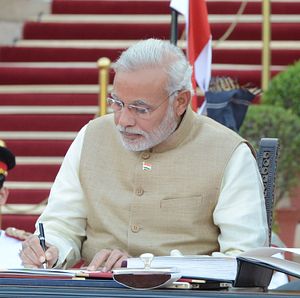Indian Prime Minister Narendra Modi has been one of the more dynamic Indian prime ministers when it comes to foreign policy, having visited over 20 countries in his 16 months in office so far. Modi’s efforts have paid off, it seems. New public opinion data released by Pew Research shows that Indians overwhelmingly approve of Modi’s approach to foreign policy (and even domestic policy, though I won’t discuss that in this piece; read the whole report here for details on the domestic policy survey data). The foreign policy results are somewhat unsurprising given that Pew finds that a whopping 87 percent of Indians surveyed expressed a favorable opinion toward the prime minister who came to power last May with the strongest mandate for any Indian prime minister in nearly 30 years.
Specifically on foreign policy, 91 percent of Indians surveyed expressed confidence in Modi’s handling of India’s affairs on the world stage. The prime minister’s tendency to travel widely and frequently, meeting with foreign dignitaries visibly and transparently, has paid dividends it seems. On relations with the United States, China, and Russia, more Indians approve than disapprove of the prime minister’s handling of relations. The reaction to Modi’s handling of relations with the United States is particularly positive: 66 percent of respondents approve while just 13 percent disapprove.
Another telling figure is that while in 2014 just 48 percent of Indians had confidence in U.S. President Barack Obama “to do the right thing regarding world affairs,” the new data from 2015 shows that now 74 percent do. Over the past year, Modi and Obama have visited each other’s countries, possibly leading to the up-tick in perceptions of the latter in India. In general, Indians are more optimistic about a range of world leaders propensity to “do the right thing,” including Japan’s Shinzo Abe (36 percent), Russia’s Vladimir Putin (36 percent), and even China’s Xi Jinping (29 percent). Additionally, the Pew data shows that Xi, Abe, and Putin don’t command the same sort of name recognition India that Obama does (17 percent of Indians have no opinion of Obama while the numbers for Putin, Abe, and Xi are 49, 47, and 42 percent respectively).
While more Indians approve than not of Modi’s handling of relations with China and Russia, the data reveals more polarization regarding relations with these countries than the United States. For example, 30 percent of respondents disapprove of Modi’s approach to China while just 39 percent approve. (The numbers are 29 and 37 percent for Russia, respectively.)
India’s rival and neighbor to the west, Pakistan, is the one area where Indian public opinion shows some trepidation about Modi’s approach. Indians overwhelmingly cite Pakistan as the biggest threat facing India (86 percent), following by the Naxalites (82 percent) and then Lashkar-e-Taiba (74 percent), an anti-India militant outfit based out of Pakistan. China comes in fourth with 67 percent of respondents describing it as a serious threat. When it comes to approval of Modi’s approach, more respondents disapproved than approved 50 percent to 25 percent. The prime minister’s decision to cancel foreign secretary-level talks and, more recently, the national security adviser talks has shown his willingness to stand his ground against Pakistan, even when it comes to diplomacy. This hasn’t translated into popularity, even among members of the BJP, the prime minister’s own party.
On Pakistan, a particularly interesting statistic caught my eye. Pew saw it fit to ask Indians if they thought U.S. policy in South Asia favored India or Pakistan, and, by a ratio of nearly four-to-one, respondents said they thought the U.S. favored India. This will be music to the ears of many in Washington as, for years, despite U.S. interest in closer strategic cooperation with India, New Delhi resented Washington’s ongoing alliance with Pakistan. In recent years, the U.S.-Pakistan alliance has started to fray, not the least due to the 2011 fracas concerning a covert U.S. raid against Osama bin Laden in Abbottabad. That Indians now see U.S. policy in their favor instead of Islamabad’s is just one more factor abetting a longer-term U.S.-India alignment in South Asia.

































